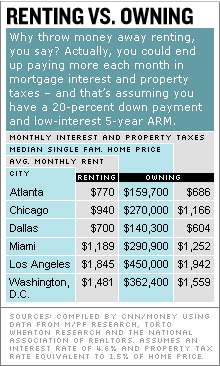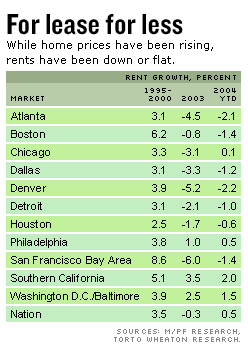SALEM, Ore. (CNN/Money) –So, you think renting is for chumps.

Considering that, on average, home prices in the United States have appreciated almost 50 percent over the past five years, home ownership might seem like a no-brainer.
Even if prices don't continue to increase at that pace – and most experts don't think they will – there are all kinds of reasons to own the roof over your head.
But, there are also plenty of reasons not to.
Entrepreneur Andy Moeck, 32, listed a half dozen reasons for renting his two-bedroom apartment in Newport Beach, Calif. He travels a lot. He's single. He thinks the housing market in Southern California is turning south. He's not sure where he wants to live. He owns investment property in other cities.
"It just makes sense for me to rent," he said.
Retirees Alan and Carol Terp have always owned their own home. Recently, though, they sold their house in California and started renting a house in Bend, Ore. "It got to the point where my husband realized it was too much yard work to handle, and I got tired of seeing property taxes go up," said Carol. "It's a relief to not have to worry about taxes and maintenance."
Are you ready for a commitment?
Home ownership, for all its advantages, comes with a laundry list of responsibilities that would-be buyers overlook or forget about when they get caught up in the dream of ownership.

"A house is a big commitment," said Barbara Steinmetz, a financial planner in Burlingame, Calif. "Some people don't take it as seriously as they should."
There is the financial commitment. Not only do you have to fork over the cash for a down payment and closing costs, you have the ongoing expenses of a mortgage, property taxes and maintenance.
There is also the time commitment. If you're not planning to stick around for at least a few years, you could easily lose money on the deal even in a strong housing market.
Consider this scenario: You buy a $300,000 house and sell it a year later for 10 percent more than what you paid, which is an exceptional return by historical standards. After you pay the real estate agent, account for your closing costs and pay capital gains taxes, you will walk away with about $6,000 – which you may have already blown on new appliances and furniture.
If under the same scenario your house appreciates 5 percent, which is still a solid return for real estate, you'll lose money on the deal.
But at least you didn't throw money away renting, right?
Let's assume you manage to scrape together $60,000 for a down payment and finance with a low interest rate – 4.6 percent for a 5-year ARM since you aren't sure you'll stick around very long.
During your first year you'll pay $10,960 in interest and only $3,800 toward principal. What you do stash away as principal will likely be eaten up by property taxes, which range from 1 percent to 3 percent of the price of the home, depending on where you live. (See "Big city taxes.")
Add to that homeowners dues and maintenance costs and you very well may "throw away" more money owning than renting.
It's true that you'll get some tax breaks on the mortgage interest. Assuming you itemize your deductions and are in the 25 percent tax bracket, the $10,960 you pay in interest may work out to a $2,740 deduction from your federal income taxes.
Then again, if you rent you can always take the standard deduction, $4,850 for singles and $9,700 for married couples filing jointly in 2004.
Are you realistic about the market?
At the same time home prices have been going up at a double-digit rate in many parts of the country, rental prices have been flat or falling.
"Two years ago you could save $200 to $300 a month owning a condo in Boston instead of renting," said Gleb Nechayev, an economist with Torto Wheaton Research in Boston. "Now it's just the opposite, yet people perceive that home ownership is the better option."
Buyers, he said, are willing to pay a premium to own property because they assume that prices will continue to increase at a ridiculous pace.

Home prices between the third quarter of 2003 and the third quarter of 2004 increased by an average of 12.9 percent, according to the Office of Federal Housing Enterprise Oversight. But looking back over the past 10 years, returns haven't been nearly so impressive.
Assuming you're ready to commit to a house, plan to stick around and can afford to ride out price dips, it still makes sense to buy while rates are low. "Sitting on the sidelines hoping the market will come down could be foolhardy," said Steinmetz.
If, however, you are in no hurry to buy, you might be pleasantly surprised by what you'll get for your rental dollars.
For $1,600 a month, Moeck has views of the ocean, two parking spaces and an "Austin Powers" fireplace that lights with the flip of a switch. The same place, he guesses, would cost twice as much a month to own.

|